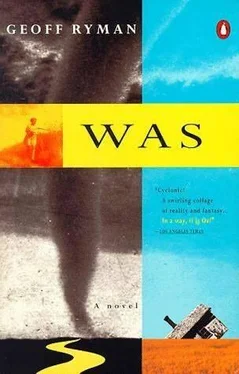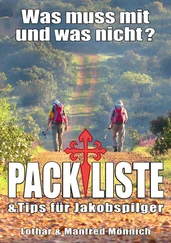The wall looked to him exactly like the face of a faraway hill. He began to see the evergreen trees in its blue mistiness. There must be a deep gully, a valley between him and the slope. He smelled water. A river too, full of cool spray.
"I didn't know there was a valley with a river here," said Jonathan.
"What?" asked Ira. His knuckles on the steering wheel were white.
"There, the valley over there, with the river." Jonathan pointed at the shopping plaza.
Ira was sweating. He kept looking over at Jonathan, and pushing his glasses back up his nose.
"We need some gas," Ira muttered to himself. He signaled and pulled in, under a bright canopy with Coke machines and the glimmer of piped music. A Mexican strode over to the car and saluted them. He held up a bottle of wine. He smiled, face creased, some of his teeth outlined with gold. He held the bottle out to Jonathan. Jonathan smiled blearily back and took a swig.
Ira came back to the car after paying.
"That will be some surprised Mexican if he finds out he's HIV positive," said Ira.
Jonathan suffered a moment of clarity. "It doesn't spread that way, Jo-Jo." Jo-Jo? He had just called Ira by his own nickname.
"You've got bleeding gums," said Ira, succinctly. He turned the car key with a wrench and the engine made a grinding sound. They pulled out into the wide boulevard, toward the on-ramps.
Very suddenly, in the middle of the road, Ira stopped the car. He threw off his glasses and covered his face and sobbed, and wiped his eyes with the heel of his hand.
"I don't think this is a good place to stop, Ira."
"Oh, shut up!" said Ira.
A truck howled in alarm behind them, swerved onto the wrong side of the road and, blaring hatred, roared past them.
"You used to be a pretty bright guy, you know?" said Ira quietly. He put his glasses back on and started the car and crept carefully forward.
"I get confused, Ira. Ira?" Ira didn't answer.
Jonathan needed Ira to take the terror away. Jonathan shrank down very small and quiet in a corner of the car, so that Ira would not be angry. So that Ira would not go away. The freeway, the Santa Monica hills, sped past in the darkness.
Jonathan began to sing. He was not aware of it.
I would wile away the hours
Conferring with the flowers
Consulting with the rain.
I would dance and be merry.
Life would be a ding-a-derry
If I only had a brain.
"Don't sing that," said Ira, teeth together.
Jonathan shrank even smaller.
The car pulled into the garage, a reassuring throb of engine bounding back from the narrow walls and a smell of gas and the settling down of light and noise when the engine was turned off. The sensations of coming home.
They walked around to the front, into the garden, and then Ira pitched himself forward. It was Ira's turn to be sick.
"Ira? Ira?" Jonathan's hands danced like butterflies.
Ira rolled sideways and sat in a garden chair, head in hands, glasses dangling.
"Are you sick?" The prospect of Ira being ill too filled Jonathan with alarm. "Let me get you a drink or something."
"I don't want anything." The garden floodlights made Ira look blue-white. He sat still with his eyes closed. "I'm very tired, Jonathan."
Jonathan had to say something. He found that he was fighting. "Maybe we could, maybe we could arrange like a holiday for you."
"Juh!" said Ira, turning away, eyes still closed. With a great effort he stood up and began to walk up the steps.
Jonathan followed him, his head wobbling like an Indian dancer's. Everything felt loose, as if his ligaments had come untied. "You. You could stay at Jenny's for a few days, Ira, in the hills. I'll be okay, I can stay here, maybe see a few people, go out for dinner. You're very tired, Ira, I can see that, I feel real bad about that, I know I make you do everything…"
I leaned on you too hard and you broke.
Ira stopped in front of the door and turned. "Do you think I want to go through all this twice?"
Ira wanted to go away.
"No, no, of course not, that's why I said, maybe a break would be a good thing." Jonathan followed Ira across the darkened living room, into the kitchen. "Maybe the time has come to get a cleaning lady or something or a nurse or something, you know, just to take some of the strain."
Ira was greedily drinking a glass of water straight from the tap instead of the filter. The freezer buzzed, where Ira kept the coffee beans frozen until they were ground. So it would be healthier. Ira turned and looked at him solemnly, heavily, like stone. Jonathan looked at him.
"Please don't go, Ira."
"Where the fuck can I go?" said Ira. He walked with his tumbler of water into the bedroom. "I carry it around with me."
"You're working too hard."
"I'm working too hard to keep away from you," said Ira. He began to undress. He kicked off his trousers, leaving them discarded, twisted. He really was getting very fat. His body was familiar, like an old pillow.
"That bad, huh," said Jonathan.
"That bad. Now if you don't mind, I'd like to get some sleep."
Jonathan stood helplessly in the middle of the room. They slept separately now; sleeping next to Jonathan was unpleasant; he knew that. He shivered, he sweated, he got up. He didn't expect Ira to sleep with him, but he did want to be touched, he did want to be held. He wanted to be comforted.
Without saying anything, Ira began insistently to push him back out of the room.
Jonathan panicked. He began to gabble as he walked backward, as if a tape were being rewound. "Ira. Don't go, huh. I'll ease up, I'll do anything, I'll go away and come back, I'll do anything, only please, Ira, please don't leave me alone!"
The door was closed. He stood looking at it.
"Oh, God," said Jonathan, to the ceiling. What do I do now?
You try, said a more sensible voice, to get some sleep. You try to get yourself calm and try to sleep. You've got a disease to fight.
Even if I want to die?
The room was spinning anyway. Oh God, Jonathan felt himself surrendering the world from exhaustion. He stumbled toward the big easy chair.
In something like sleep, he dreamed. He dreamed he had played the Scarecrow after all. He was swept up in the magic circle of light, and gave the performance of his life. The Scarecrow was goofy and brainless, at war with the physical world, possessed of imagination, another kind of intelligence. He was more magical than the Wizard, kinder than the Tin Man, braver than the Lion. The Scarecrow was the favorite. He and Dorothy danced around and around in circles like a cyclone, filling the vacuum at its heart.
He woke up and knew what he had to do. He did not have much time.
He stood up and emptied his pockets. The garage keys, the bungalow keys, he left on the table in his little niche with the stained-glass window. He didn't want to die in L.A., alone, listening to NPR, waiting for someone, anyone to call. He didn't want to bother Ira, torment him, make Ira take care of him and make himself sick. Jonathan wanted to disappear. He wanted to make one last visit to Back Then.
He left his keys, but no note. He took his little purse, with notebook and credit cards. He smiled. An adventure. What do you want to do? people always asked him when they found out, meaning, Do you want to write a novel? Travel? I want, thought Jonathan, to do this.
He closed the door behind him. It was locked. He could not go back. He went down the steps. There was a silver hint of dawn in the sky. He would catch the blue bus on Wilshire and then the blue bus along Lincoln. He would take the big blue bus to Oz.
After Ira and Jonathan left, Bill had climbed up the wooded hill in back of his house. He looked down on the City of the Angels, at its rivers of moving light. He felt wonder at the world. Unaided by faith or meditation, a visitor to his house was having visions, like a medieval monk. Bill Davison was going to pray to the blank yellow-gray sky, to the lights, to the God that drove them all. He suddenly found that he couldn't.
Читать дальше












